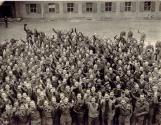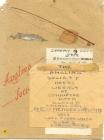14
Chieti Yacht ClubAngling Club
16
Sometimes the gathering was to hide the noise created by the actions of others who were tunnelling.Buxton's role was as a soil disperser which was siphoned slowly and placed in garden plots that Officer's were allowed to grow with seeds from the Red Cross, or in one case transferring the soil to an unused attic. Empty milk tins were used to fashion a fresh air line for the tunnel diggers. Whenever possible, German guards were bribed or particular prisoners were chosen to become friendly with certain guards and then goods and information was exchanged. Once this occurred the guard could be blackmailed to continue to provide aid.
When the Italians capitulated in Sept 1943, the POWs in the camp were again rounded up by the Germans and conveyed in cattle trucks to Moosberg, a short distance from Munich. This was a very large camp (reputedly holding 22,000 displaced persons) surrounded by a very high barbed wire fence which enclosed a number of smaller compounds for prisoners of war of various nationalities.
Buxton was asked if he knew about any of the atrocities which were being perpetrated by the Germans. Buxton said he knew nothing until after the war but remembered an incident in Moosberg where the Germans had brought cattle trucks filled with half-dead Russians and other nationalities who were put into the smaller compound next to the one in which we were housed. It would appear that the occupants of the cattle trucks who had been traveling for 12 to 14 days without food or sanitation were either dead or only half alive. Those who appeared partially mobile were thrown into the adjoining compound where they created a situation which resulted in the Germans releasing three attack dogs into the group. The dogs were no match against the starving detainees who killed and ate the dogs. Their remains were thrown back at the Germans!
From Mooseburg Buxton was transferred to Marishe Trubau in Czechoslovakia and finally to Braunschweig, Germany. Moves of POW Officers occurred occasionally to discourage Allied bombing of targets by placing the Officers close to operating German facilities such as airfields, military barracks, factories and the Autobahn.
Frequently they were bombed by the Americans during the day and, in fact were the target of a very large raid which killed or injured a number of POWs.
We were eventually liberated on April 12, l945 by the 125th US Cavalry.
17
Prisoners of the Braunschweig prisoner of war camp on the day of their release.1945
Braunschweig, Germany

18
After they were liberated they were flown to Brussels where they were stripped down, de-loused, and showered. The liberated POWs then were dined, issued new battle dress and flown home.Buxton concluded that the happiness of getting back into the bosom of his family was marred by the announcement by his bank manager that a substantial portion of his pay had been taken to honour chits which had been given out by the senior British Officer in the camps to buy food on the black market to augment food which should have been supplied by the Italians and Germans.
Following the end of the war, Buxton joined the civilian workplace. He immigrated to Canada in 1958 and eventually ended up on Vancouver Island.
Buxton now resides in Nanaimo and continues to be a staunch supporter of many Military Associations.
He also contributes to the development of Canada's future by proudly supporting 205 Collishaw Royal Canadian Air Cadet Squadron.
Ronald E. Buxton died in Nanaimo on 30 May, 2007.
